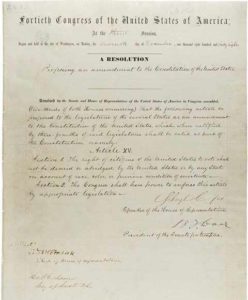On July 28, 147 years will have passed since the ratification of the The Fourteenth Amendment—the amendment that granted Blacks full citizenship rights as part of the Constitution in 1868.
Originally proposed in response to issues of once enslaved Blacks after the Civil War, in which many Blacks fought and died, the amendment addresses citizenship rights and equal protection under the law.
However, the original amendment didn’t cover the full scope of all humans, including Blacks who were freed after the Civil War. When the ratification came it included, “all persons born or naturalized in the United States.”
The amendment was initially rejected by most southern states, but was ratified because it received the required three-fourths of state’s votes. It became known as the “Reconstruction Amendment,” one of three along with the 13th and 15th amendments which had a major impact on redefining the rights of America. The amendment forbids any state to deny any human, “life, liberty or property, without due process of law” or to “deny any person within its jurisdiction the equal protection of the laws.”
While the ratification of this amendment was instituted 147 years ago on July 9, and certified by then Secretary of the State William Seward on July 28th, the issues of its inception— due process and equal protection—still resonate now. Eric Garner, Freddie Gray and Sandra Bland, all of whom died upon encountering law enforcement come to mind, as concerned citizens raise their voice in the name of their human rights and that of all Black Americans who are citizens of the United States.
So what human rights do these clauses support?
The first, the Due Process Clause, operates within the administration of justice, with the intention that one’s rights will not arbitrarily be denied, including life, liberty or property. According to the Supreme Court, it acts broadly in its interpretation and protection of this clause including procedural due process (in civil and criminal proceedings), substantive due process, a prohibition against vague laws, and as the vehicle for the incorporation of the Bill of Rights.
The second, the Equal Protection Clause, upholds that a state shall not deny any person within its jurisdiction “the equal protection of the laws.” The application of this law is defined geographically, by constituted legal bodies.
One of the most litigated sections of the Constitution, the Fourteenth Amendment set historic precedents for decisions such as Roe v. Wade (1973) regarding abortion, Bush v. Gore (2000) regarding the 2000 presidential election and Obergefell v. Hodges (2015) regarding same-sex marriage.
The deaths of Garner, Gray and Bland are examples of why it’s important to not just be aware of, but truly understand the law and your Constitutional rights.



